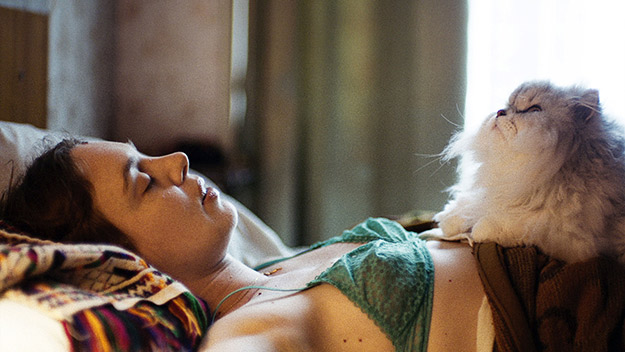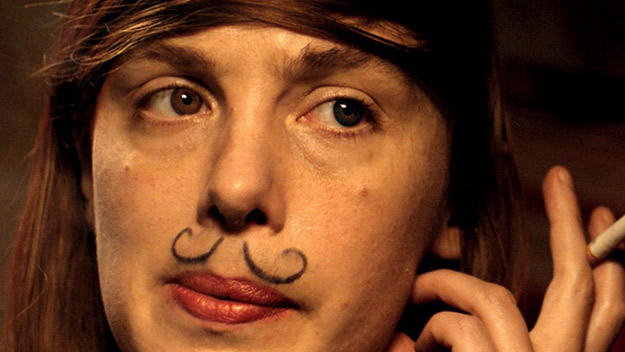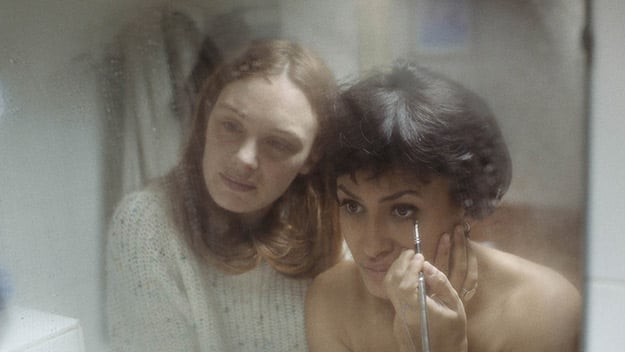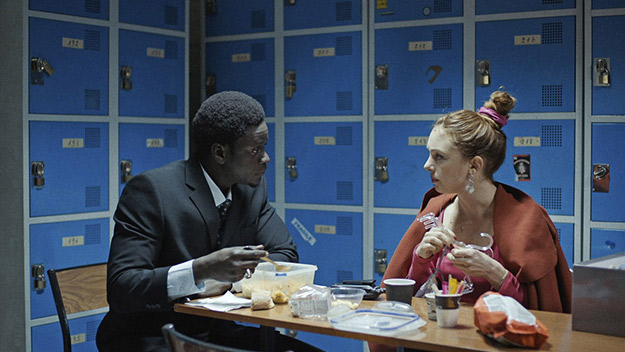Film of the Week: Montparnasse Bienvenüe

Talk about making a spectacular entrance. Not only do the heroine of Montparnasse Bienvenüe, and Laetitia Dosch who plays her, come on like a storm in the opening sequences of this new French film, so does writer-director Léonor Serraille. Her Parisian comedy means business with a furious intensity like few debut features we’ve recently seen, and it couldn’t be a better time, either. Premiered in Cannes last May, months before the Weinstein revelations broke, it’s as if Serraille’s vigorously feminist feature was ready poised to make its wider public appearance once #MeToo and Time’s Up had changed the tenor of gender discussion in movies and in the world.
Screening in the Film Society of Lincoln Center’s Rendez-Vous with French Cinema series, Serraille’s film has been given the international release name of a Parisian Metro station, which doesn’t convey a great deal about it. The original French title is simply Jeune Femme—“young woman”—which, despite also not giving much away, is something of a statement of intent, as well as highly resonant. That’s “young woman” as in “Young woman needed for badly paid, exploitative job,” and as in the fact that heroine Paula worries that, as she puts it, “31 is nearly 40”—that the youth which might help propel a woman through one of her easier decades, may be about to desert her, making her already difficult life a lot harder.
The first time we meet Paula, she fairly erupts onto the screen, shouting the house down and head-butting a door till her forehead bleeds. The door belongs to her ex-boyfriend Joachim, at first only encountered as a voice on an intercom. He’s damned if he’s going to let her into the apartment and back into his life, and she’s damned if she’s going to take no for an answer, from him or from the world. We next see her in a hospital emergency department, treating a medic to a torrent of manic talk, telling him about the time that she and Joachim spent in Mexico; and about the fact that Joachim, her former lecturer, became famous as a photographer thanks to a portrait of her; and insisting, “I’m not very intelligent… but I’m honest.” She’s vehemently resistant to soft-soaping. The positive thing about her situation, the medic tells her, is that at least she’s free—to which she rages, “Oh, fuck off with your freedom shit—freedom’s for egotistical pricks.”

With nowhere to live—and no one to share her plight with except Joachim’s cat, which she’s kidnapped—Paula storms off into the night in search of somewhere to stay. A pregnant friend turns her away for fear the cat carries germs. Then, ingeniously but misguidedly using a toilet roll as a makeshift fancy-dress prop, she goes to a party as a just-about-plausible approximation of Amy Winehouse. There she’s hit on by a dubious sophisticate who reassures her, “Don’t worry, I’m in the champagne business,” before, in a bogus “sensitive” fashion, getting off on her visible distress. “You’ve been crying. I’m touched,” he purrs. “Go and touch yourself,” Paula hisses, and makes a rapid exit.
Jeune Femme, to call it by its snappier name, is a catalog of farcical, borderline tragic episodes: Paula tries to dump the cat at a cemetery to fend for itself, but then—after a single close-up shot of her looking rueful—takes it to a vet for patching up, presumably after a night fighting the zombie cats of Paris. She has a joyless solo expedition to a club where everyone except her is feeling sexed up, and has an aimless ride on the Metro, a frantic montage set to the bustle of Gil Evans’ “Las Vegas Tango.” It’s on the Metro that she’s approached by Yuki, an extroverted, sexually self-confident, Cleopatra-bobbed young woman (Léonie Simaga, flamboyantly going to town). Yuki has recognized Paula—by her eyes, which are two different colors—as her long-lost friend from primary school. She takes her in for the night, and shows her humor and flirtatious affection; Paula manages to get through to morning without letting on that she’s actually never met Yuki before.
This deliriously propulsive film bowls along from one incident to the next, Paula getting on by the skin of her teeth, while intermittently raging at anyone she happens to meet. Eventually she seems to find her footing, in two different jobs. One is working at a “knicker bar” (I‘m not sure why, but it sounds funnier in French: bar à culottes) in a cavernous, impersonal mall—presumably in the Tour Montparnasse, as the international title suggests—following a superbly staged jump-cut interview sequence (Clémence Carré’s editing is terrific throughout). Desperately trying to make a good impression, Paula babbles and throws enthusiastic smiles straight to camera, while her off-screen interviewer drops nuggets of corporate rhetoric—asking how Paula feels about “le challenge”—and warns that her current lipstick isn’t color-coordinated with house policy.

The other gig, which lands her rudimentary lodging in a cramped attic room, is a live-in baby-sitting gig for a solemn, distinctly uncooperative young girl named Lila (Lila-Rose Gilberti). It’s a stroke of brilliance on Serraille’s part that Erika Sainte, who plays Lila’s mother—a breezily self-satisfied young bourgeoise—looks oddly similar to Laetitia Dosch, and could so easily be Paula herself, if only things had turned out differently.
As it is, Paula is what American jargon might call a “trainwreck”—although by comparison, Amy Schumer’s heroine in the film of that title barely deserves the label (however ironically that film tries to reappropriate it). Schumer’s character at worst has some minor scheduling issues, whereas Paula’s life is like a major pile-up between several TGV expresses and a Parisian regional RER train or two. This is a woman who, at the start of the film, is suffering traumatic disturbance after being rejected by an older lover who, although we learn little about their back story, has surely been at least cavalier towards her throughout; indeed, when we meet him, played by Grégoire Monsaingeon, he’s like all the worst polo-necked smoothie older lovers we’ve ever seen in French movies.
When I first saw Jeune Femme, I was bowled over by its dynamism and comic brio, and cautiously suggested that Laetitia Dosch might be considered something like France’s answer to Greta Gerwig. I said that mainly because—even though Dosch’s brand of manic energy here is more abrasive than anything we’ve seen from Gerwig—she brings to Jeune Femme the kind of irreducibly intense charisma that Gerwig brought to Frances Ha, another film in which a neurotic heroine is on screen in practically every shot. On a second viewing, I’d revise my view somewhat, and maybe play down the idea that Jeune Femme is strictly a comedy. It’s a very hard-edged film, one of those comedies that make you laugh because they go uncomfortably close to the edge of despair: Paula’s life in limbo is one of isolation and desolation, and her misadventures here are like a descent into hell.

She’s alone and unloved in a city she doesn’t much like; it’s not way off the mark to say that this would make a great double bill with Mike Leigh’s Naked, another film about a compulsively mouthy loner. One of the most shocking things about the film, although it’s played for exquisitely offbeat comedy, is the way that even Paula’s mother (Nathalie Richard) can’t stand to be doesn’t near her. She literally throws her daughter out of the house, but Paula finds her way back in, then—in an extraordinary bit of physical farce—has to clamp her leg round the bannister to avoid being kicked out again. We don’t know what’s gone wrong between them, but an inspired quirk of design shows us that something is really amiss, and has been for a long time: it’s the way that the shoots of a Swiss cheese plant snake untamed right across her mother’s living-room wall.
Amid the grief, Paula does make some sympathetic human contact—notably, with Ousmane (Souleymane Seye Ndiaye), a mall security guard, and Lila, who eventually thaws over a huge wodge of candyfloss. There’s also a satisfying sexual encounter, although we don’t even see it: we just get a close-up of a tentative facial touch, then a cut straight to Paula, alone in bed the next morning, smiling in a glow of daylight that lasts all the way into her Metro ride home.
Jeune Femme is one of those meteoric discoveries that you pray for to happen once in a while; it seems genuinely to have come out of nowhere, although Cahiers du Cinéma put it on their cover a full year before its Cannes premiere. Serraille has previously only directed a 45-minute short, Body (2016), with Nathalie Richard, and co-written two shorts by other directors. And Laetitia Dosch, whose filmography goes back some 10 years, has generally been under the radar; her most prominent role was the lead in Justine Triet’s Age of Panic, although she’s also worked with Maïwenn, Catherine Corsini, and Christophe Honoré. With Jeune Femme, however, she’s surely set to be an incontournable in French cinema—literally, someone whose presence there’s no getting around. On screen virtually non-stop, she blazes with ferocious energy, mixing staccato nerviness and a goofy kind of sensuousness. With a voice that alternates between quavery anxiety and harsh foghorn contempt, she’s an astonishing presence. Notwithstanding the manifest brilliance and distinctiveness of Serraille’s direction—just check out the insouciant swing of that Gil Evans Metro ride—it wouldn’t have been remotely similar with anyone else in the lead. “The thing with women,” says Paula in her job interview, “is they cut to the chase.” Dosch and Serraille go one better—Jeune Femme is all chase, with occasional pauses for breath, and it leaves the audience gasping with exhilaration.
Montparnasse Bienvenüe (which premiered as Jeune Femme at Cannes) screens March 9 and 12 in Rendez-Vous with French Cinema.
Jonathan Romney is a contributing editor to Film Comment and writes its Film of the Week column. He is a member of the London Film Critics Circle.







